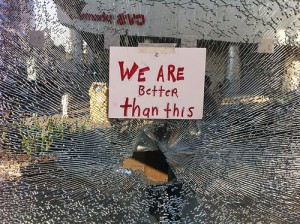In recent weeks judges have issued stay-away orders to about 20 Occupy Oakland protesters who have been charged but not yet convicted of any crimes, according to lawyers from the National Lawyers Guild and Occupy Oakland organizers. The orders, issued at the request of Alameda County District Attorney Nancy O'Malley, bar the protesters from coming within up to 300 yards of Frank Ogawa Plaza, formerly the epicenter of the Occupy Oakland movement.

But on Thursday, the ACLU challenged the orders, filing petitions with the Alameda County Superior Court on behalf of four protesters facing charges ranging from blocking a sidewalk to assaulting a police officer.
ACLU Staff Attorney Michael Risher said the stay-away orders violate First Amendment rights and the California constitution.
“Courts have made it clear, there’s a special value in being able to speak in front of the seat of governmental authority, whether it’s the White House or whether it’s Oakland City Hall, which of course borders on Frank Ogawa Plaza,” Risher said. “And that right doesn’t go away simply because someone has been arrested at a previous demonstration.”
Deputy District Attorney Teresa Drenick said in a statement that the stay-away orders are aimed at violent protesters and are “reasonable and necessary.” In an op-ed published last month in the San Francisco Chronicle, Alameda County District Attorney Nancy O’Malley wrote:
Let me be clear: These individuals were not rallying on behalf of Occupy Wall Street, or even the greater Occupy Oakland movement. Rather, they advertise themselves as "militant, anti-government, anti-police, and anarchists," with a mission to destroy the community fabric of Oakland through the use of violence.
But Risher said the use of stay-away orders for protest movements is uncommon.
